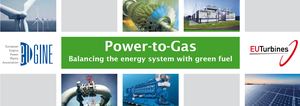Power-to-Gas: Balacing the Energy System with Green Fuel
This joint EUGINE and EUTurbines conference presented Power-to-Gas in power generation as a promising solution to contribute to the increasing demands for flexibility in the energy system, and explored the opportunities and challenges of this option. The conference, attended by over 60 participants, started with two speeches, followed by a high level panel discussion moderated by Sonja van Renssen (Energy Post).
A long-term storage solution for the future challenges
The electricity system will be facing a “massive” challenge due to the increase of volatile renewable energy sources, pointed out V. Philip, Chief Technology Officer at Siemens Power & Gas. Regarding excess energy in periods of much wind and sun, “the worst thing we can do is to leave this excess energy to waste” he added, presenting Power-to-Gas as an efficiency and flexibility solution to help address the flexibility question.
Power-to-Gas provides an efficient, long-term storage option; a way to “store and reuse energy, when you need it, where you need it”. The potential of this solution was further supported by successful examples of existing pilot and demonstration projects.
R. Schoentgen, Director Research and Technologies at ENGIE, reminded the audience that this option can greatly contribute to decarbonisation; this is particularly the case of hydrogen, as it “is the only gas that does not produce CO2 when it is burnt”.
Several participants concurred that Power-to-Gas allows the use of existing infrastructures, both with regards to the gas grid as well as power plants, reducing the need for new investments. In the case of thermal power generation, J. Feucht, General Manager of Gas & Medium Speed Engines at Caterpillar, stressed the contributions in terms of flexibility and efficiency that existing technologies already can provide, while further R&I developments are carried out.
The necessary framework for Power-to-Gas
“We are positively excited about the developments in hydrogen”, said D. Acke, Head of Energy Union Programme at the European Climate Foundation perspective. This was a statement shared by all panellists. In order for further developments to happen, however, the participants concurred that a favourable business model is needed, making this option economically viable.
For E. Hennig, Head of Department for Policy Issues at Thüga AG, the right framework includes considering hydrogen and syngas biofuels and treating Power-to-Gas plants in the same way as other renewable technologies – especially in terms of exemptions to fees and levies as well as start-up financial support. In the same way, the speakers also emphasised the importance of rewarding flexibility in the future electricity market design, ensuring the necessary incentives for investment and further development of this solution.
T. Constantinescu, Principal advisor to Director General Ristori at the European Commission, concurred with other speakers on the need to increase the flexibility of the future energy system, where renewable energy sources will be at the centre. He also further referred to the areas in which the Commission is working on, in order to achieve a stable framework for Power-to-Gas.

14 November 2016





